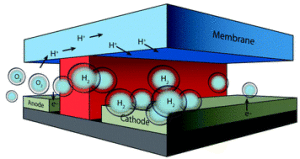
Small-scale device provides easy “plug-and-play” testing of molecules and materials for artificial photosynthesis and fuel cell technologies.
Image: Joint Center for Artificial Photosynthesis
Scientists have developed a small-scale device that can aid in the advancement of artificial photosynthesis and fuel cell technologies.
The new device provides an easy “plug-and-play” microfluidic test-bed to evaluate materials for electrochemical energy conversion systems. Researchers will now be able to test small amounts of molecules and materials before producing a full-scale device to insure new devices will provide high energy density.
Sophia Haussener and Joel Ager, published ECS authors and past members, were two of the researchers that worked on the project for the U.S. Department of Energy. (Check out Haussener’s past research on photoelectrochemical water-splitting and Ager’s work in electron diffraction.)
This from U.S. Department of Energy:
As all functional components in this microfluidic test-bed can be easily exchanged, the performance of various components in the integrated system can be quickly assessed and tailored for optimization. The initial experiments and modeling were performed for water electrolysis; however, the system can be readily adapted to study proposed artificial photosynthesis and fuel cell technologies.
The researchers believe that this technology will be easily adaptable to other technologies, such as solar-fuel generators. Development of such devices may significantly accelerate due to the new ability to assess performance at an early stage.


